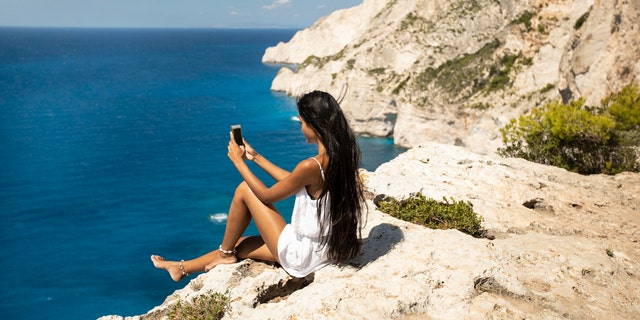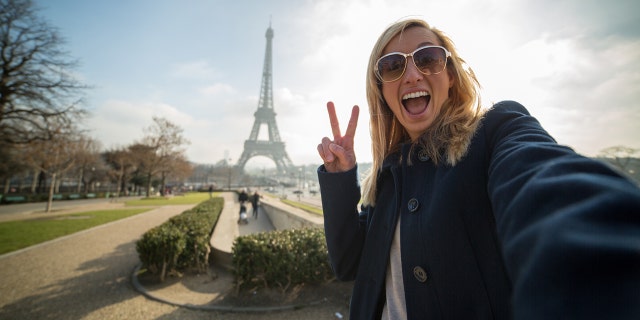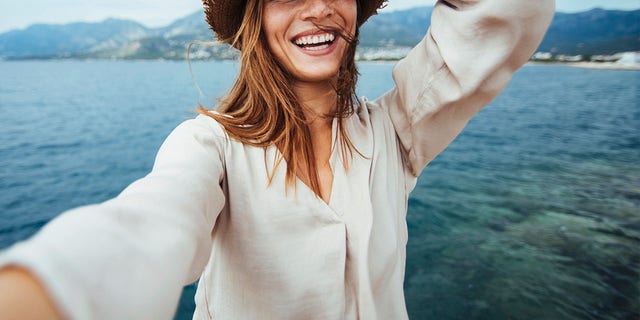Selfies without sense: People keep risking their lives for the ‘perfect’ photo
NEW York can now listen to Fox News articles!
News that a 23-year-old American reportedly fell into the crater at the summit of Italy’s Mount Vesuvius last Saturday after trying to take a selfie does not surprise some people, given today’s so-called “selfie culture.”
The tourist reportedly dropped his phone while attempting to take a selfie. The young man then climbed down several yards into the crater to retrieve it — losing his balance and falling deeper into the crater, according to reports.
After officials dramatically rescued him from the crater, he was treated for minor cuts and bruises.
Local police cited the tourist and his family members because they went off an authorized path to get closer to the crater last Saturday — apparently to take a selfie, according to LaPresse News Agency.
It could have been much worse — and for others, sadly, it has been.
Gennaro Lametta, a government tourism official, wrote on his Facebook page earlier this week, “This morning a tourist, for reasons still to be determined … together with his family … ventured on a forbidden path, arrived on the edge of the crater and fell into the mouth of #Vesuvius.”
Fox News Digital reached out to Vesuvius National Park in Naples, Italy, as well as LaPresse News Agency for additional information.
The young American is reportedly being detained by Italian officials.
Selfies gone wrong
The incident in Naples is not isolated.
The young man and “his entire group exercised terrible judgment,” said one psychologist.
In January of this year, 21-year-old Richard Jacobson was hiking at night in Arizona’s Superstition Mountains when he walked to a cliff to take a selfie against a backdrop of Phoenix’s city lights, as Fox News Digital previously reported.
Tragically, Jacobson slipped and fell 700 feet, according to Fox 10 Phoenix.
Another hiker found the young man’s body near Flatiron Peak at the Lost Dutchman State Park on Jan. 24.

Tourists choose beautiful and unique backdrops for their photos — but all too often, they’re not thinking of safety as they try to get the “perfect” photo.
(iStock)
Researchers associated with the All India Institute of Medical Sciences, a group of public medical colleges in New Delhi, reported in a 2018 study that over a six-year period, more than 250 people died around the world while trying to get the perfect selfie.
The conclusion of the study?
“‘No selfie zone’ areas should be declared across tourist areas,” the researchers said, “especially [in] places such as water bodies, mountain peaks, and over tall buildings to decrease the incidence of selfie-related deaths.”
Why would someone risk life and limb to get the perfect picture?

There is much more to the dangerous “selfie culture” than just youthful narcissism, a California psychologist expressed to Fox News Digital.
(iStock)
Fox News Digital spoke to Dr. Pamela Rutledge, a member of the faculty at Fielding Graduate University in Santa Barbara, California, and director of the Media Psychology Research Center in Newport Beach, California, about the latest incident and about “selfie culture” in general.
Rutledge feels there is much more to the dangerous “selfie culture” than just youthful narcissism.
INFLUENCER PLUMMETS TO DEATH WHILE SNAPPING WATERFALL SELFIE
Today, she said, “people are pretty used to selfie culture, and it’s thought of [as] a pejorative, because most of the people who take selfies are young,” she said.
Rutledge said young people have as their “primary task” the idea of “figuring out who [they] are in the social world.”
“Older people talk about selfie culture as if it’s a function of narcissism, but so much of our lives has moved onto our mobile phones, especially for young people.”
Rutledge said young people have as their “primary task” the idea of “figuring out who you are in the social world, emancipating from your family unit … which means that you have to learn how to negotiate your social world. Your focus is very outward.”

A young woman takes a selfie while biting into a slice of pizza. Cell phones have become a “personal extension” of our lives, said one psychologist.
(iStock)
Calling the phone a “portal to the social world,” Rutledge said phones have become a “personal extension” of our lives.
“It’s one thing to get spam email,” she said. “It’s another when you get spam texts — it feels very invasive.”
“For years, portraits were how people established their power and dominance in society.”
Rutledge said it is not just the convenience and ease of using cell phones that drives people to snap selfies — but a function of human nature and of society, too.
“For years, portraits were how people established their power and dominance in society,” she noted. “You hired Rembrandt and he painted your picture. That meant you were powerful.”
Once people could take their own pictures and upload them for free, this “democratized that entire phenomenon — the self-portrait,” she said.

A couple sit on a convertible while they take a selfie. Dr. Rutledge said that in times past, having one’s portrait painted indicated power. Today’s selfies can indicate confidence, happiness and many other feelings and traits.
(iStock)
Photographs allow us to re-experience events in a way much different from just remembering them, said Rutledge.
“You have this ability to give meaning to moments that would have easily fallen by the wayside if you had just relied on memory,” she said.
COLORADO RESIDENTS AIRLIFTED FROM ROCKY MOUNTAIN NATIONAL PARK
Speculating that the young man who fell into the Vesuvius crater last week may have been “spiked on adrenaline” during his sightseeing trip to the volcano, she explained the brain physiology of people in their 20s.
“The prefrontal cortex isn’t fully developed until the mid-20s, so there is a slow maturation in the ability to calculate risk,” she said.
“Social media has made people very reliant on others’ validation through ‘likes’ and comments.”
As for the notion that the young man may have risked his life for a selfie at Mount Vesuvius, she said bluntly, “[His] entire group exercised terrible judgment.”
Aiming to ‘impress people’ on social media
Two women in their early 20s weighed in on today’s selfie culture. Image is everything when it comes to getting that perfect shot, they told Fox News Digital.
“I think people are very concerned with impressing people through their social media, and they want to get the coolest shot, so they impulsively do reckless things without fully thinking how dangerous it is,” Natalie Bloom, a 23-year-old who lives outside Boston.

People do “crazy things” to try to get a great photo, said one 23-year-old.
(iStock)
“All they are thinking of is how cool the picture would be,” she added.
“I think society’s obsession with social media will drive people to do crazy things in order to get a good photo,” 23-year-old Amanda Buczynski, also from the Boston area, shared with Fox News Digital.
“Social media has made people very reliant on others’ validation,” she added, “through ‘likes’ and comments.”
“It’s to the point where people don’t even take pictures anymore because they are truly enjoying the experience.”
CLICK HERE TO GET THE FOX NEWS APP
“They take them because they want others to think they are having a good time,” she also said.



